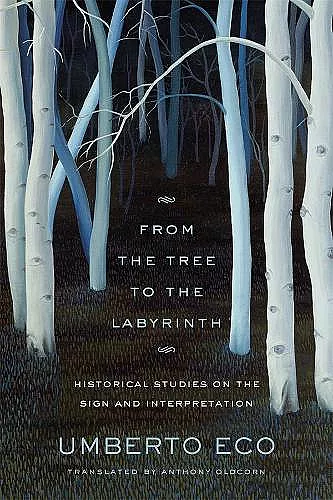From the Tree to the Labyrinth
Historical Studies on the Sign and Interpretation
Umberto Eco author Anthony Oldcorn translator
Format:Hardback
Publisher:Harvard University Press
Published:24th Feb '14
Currently unavailable, our supplier has not provided us a restock date

The way we create and organize knowledge is the theme of From the Tree to the Labyrinth, a major achievement by one of the world’s foremost thinkers on language and interpretation. Umberto Eco begins by arguing that our familiar system of classification by genus and species derives from the Neo-Platonist idea of a “tree of knowledge.” He then moves to the idea of the dictionary, which—like a tree whose trunk anchors a great hierarchy of branching categories—orders knowledge into a matrix of definitions. In Eco’s view, though, the dictionary is too rigid: it turns knowledge into a closed system. A more flexible organizational scheme is the encyclopedia, which—instead of resembling a tree with finite branches—offers a labyrinth of never-ending pathways. Presenting knowledge as a network of interlinked relationships, the encyclopedia sacrifices humankind’s dream of possessing absolute knowledge, but in compensation we gain the freedom to pursue an infinity of new connections and meanings.
Moving effortlessly from analyses of Aristotle and James Joyce to the philosophical difficulties of telling dogs from cats, Eco demonstrates time and again his inimitable ability to bridge ancient, medieval, and modern modes of thought. From the Tree to the Labyrinth is a brilliant illustration of Eco’s longstanding argument that problems of interpretation can be solved only in historical context.
Lush, comprehensive scholarship. * Kirkus Reviews *
From the Tree to the Labyrinth is a sort of summa of one of our most important thinkers on matters of language, signification, and interpretation. It illuminates all of Umberto Eco’s earlier work by providing a great deal of the historical contextualization for his arguments. It provides important and fruitful ways of thinking about the organization of knowledge and of our attitudes towards it. It intervenes in a number of debates in the philosophy of language and in linguistics. It contains a myriad of insights on medieval thinkers, Kant, and Peirce, to mention but a few. This is a book that will enjoy a wide readership. -- Wlad Godzich, University of California, Santa Cruz
ISBN: 9780674049185
Dimensions: 235mm x 156mm x 45mm
Weight: 1129g
640 pages